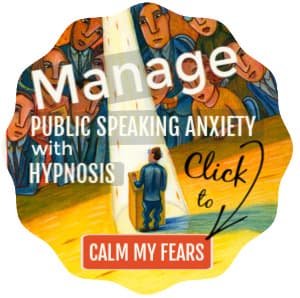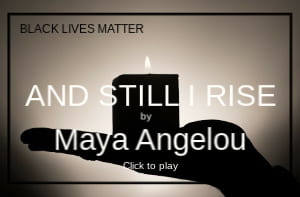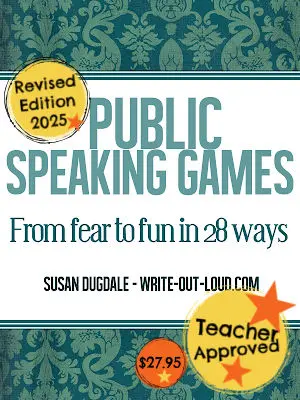- HOME ›
- How to write a speech ›
- How to end a speech effectively
How to end a speech memorably
3 ways to close a speech effectively
By: Susan Dugdale
Knowing how, and when, to end a speech is just as important as knowing how to begin. Truly.
What's on this page:
- why closing well is important
- 3 effective speech conclusions with examples and audio
- 7 common ways people end their speeches badly - what happens when you fail to plan to end a speech memorably
- How to end a Maid Honor speech: 20 examples
- links to research showing the benefits of finishing a speech strongly
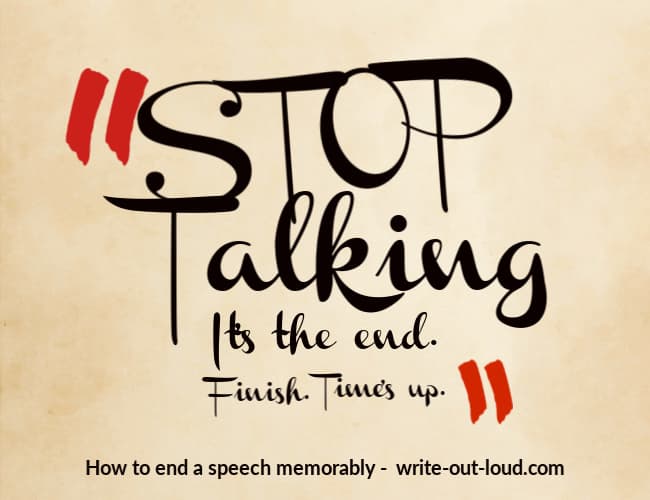
Why ending a speech well is important
Research* tells us people most commonly remember the first and last thing they hear when listening to a speech, seminar or lecture.
Therefore if you want the audience's attention and, your speech to create a lasting impression sliding out with: "Well, that's all I've got say. My time's up anyway. Yeah - so thanks for listening, I guess.", isn't going to do it.
So what will?
*See the foot of the page for links to studies and articles on what and how people remember: primacy and recency.
Three effective speech conclusions
Here are three of the best ways to end a speech. Each ensures your speech finishes strongly rather than limping sadly off to sure oblivion.
You'll need a summary of your most important key points followed by the ending of your choice:
- a powerful quotation
- a challenge
- a call back
To work out which of these to use, ask yourself what you want audience members to do or feel as a result of listening to your speech. For instance;
- Do you want to motivate them to work harder?
- Do you want them to join the cause you are promoting?
- Do you want them to remember a person and their unique qualities?
What you choose to do with your last words should support the overall purpose of your speech.
Let's look at three different scenarios showing each of these ways to end a speech.
To really get a feel for how they work try each of them out loud yourself and listen to the recordings.
1. How to end a speech with a powerful quotation
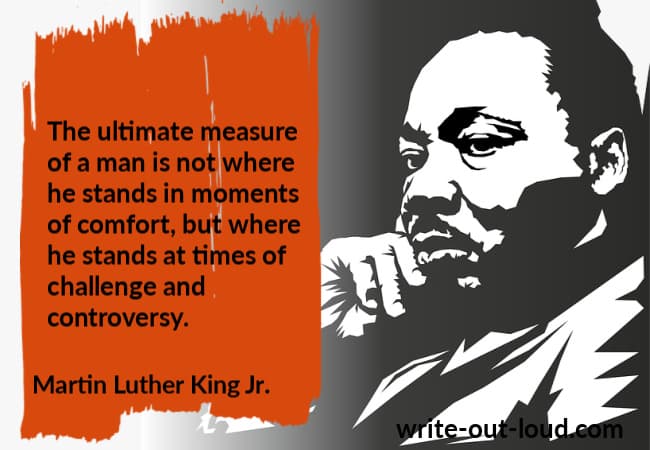
Your speech purpose is to inspire people to join your cause. Specifically you want their signatures on a petition lobbying for change and you have everything ready to enable them to sign as soon as you have stopped talking.
You've summarized the main points and want a closing statement at the end of your speech to propel the audience into action.
Borrowing words from a revered and respected leader aligns your cause with those they fought for, powerfully blending the past with the present.
For example:
"Martin Luther King, Jr said 'The ultimate measure of a man is not where he stands in moments of comfort, but where he stands at times of challenge and controversy.'
Now is the time to decide. Now is the time to act.
Here's the petition. Here's the pen. And here's the space for your signature.
Now, where do you stand?"
Try it out loud and listen to the audio
Try saying this out loud for yourself. Listen for the cumulative impact of: an inspirational quote, plus the rhythm and repetition (two lots of 'Now is the time to...', three of 'Here's the...', three repeats of the word 'now') along with a rhetorical question to finish.
Click the link to hear a recording of it: sample speech ending with a powerful quotation.
2. How to end a speech with a challenge

Your speech purpose is to motivate your sales force.
You've covered the main points in the body of it, including introducing an incentive: a holiday as a reward for the best sales figures over the next three weeks.
You've summarized the important points and have reached the end of your speech. The final words are a challenge, made even stronger by the use of those two extremely effective techniques: repetition and rhetorical questions.
"You have three weeks from the time you leave this hall to make that dream family holiday in New Zealand yours.
Can you do it?
Will you do it?
The kids will love it.
Your wife, or your husband, or your partner, will love it.
Do it now!"
Click the link to listen to a recording of it: sample speech ending with a challenge. And do give it a go yourself.
3. How to end a speech with a call back
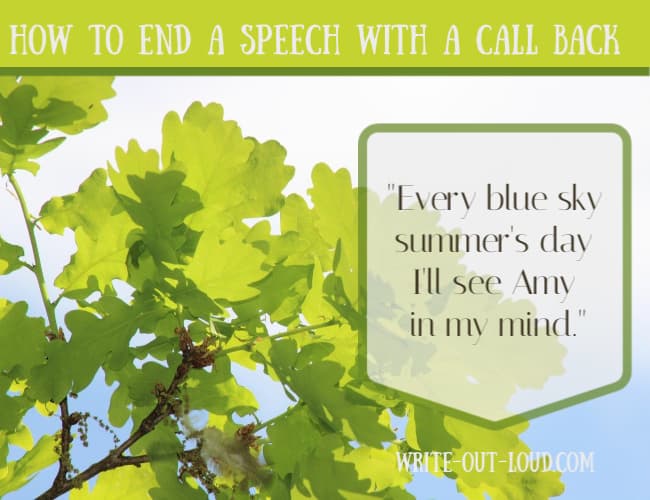
Your speech purpose is to honor the memory of a dear friend who has passed away.
You've briefly revisited the main points of your speech and wish in your closing words to leave the members of the audience with a happy and comforting take-home message or image to dwell on.
Earlier in the speech you told a poignant short story. It's that you return to, or call back.
Here's an example of what you could say:
"Remember that idyllic picnic I told you about?
Every blue sky summer's day I'll see Amy in my mind.
Her red picnic rug will be spread on green grass under the shade of an old oak tree. There'll be food, friends and laughter.
I'll see her smile, her pleasure at sharing the simple good things of life, and I know what she'd say too. I can hear her.
"Come on, try a piece of pie. My passing is not the end of the world you know."
Click the link to hear a recording of it: sample speech ending with a call back. Try it out for yourself too. (For some reason, this one is a wee bit crackly. Apologies for that!)
When you don't plan how to end a speech...
That old cliché 'failing to plan is planning to fail' can bite and its teeth are sharp.
The 'Wing It' Department* delivers lessons learned the hard way. I know from personal experience and remember the pain!
How many of these traps have caught you?
- having no conclusion and whimpering out on a shrug of the shoulders followed by a weak, 'Yeah, well, that's all, I guess.', type of line.
- not practicing while timing yourself and running out of it long before getting to your prepared conclusion. (If you're in Toastmasters where speeches are timed you'll know when your allotted time is up, that means, finish. Stop talking now, and sit down. A few seconds over time can be the difference between winning and losing a speech competition.)
- ending with an apology undermining your credibility. For example: 'Sorry for going on so long. I know it can be a bit boring listening to someone like me.'
- adding new material just as you finish which confuses your audience. The introduction of information belongs in the body of your speech.
- making the ending too long in comparison to the rest of your speech.
- using a different style or tone that doesn't fit with what went before it which puzzles listeners.
- ending abruptly without preparing the audience for the conclusion. Without a transition, signal or indication you're coming to the end of your talk they're left waiting for more.
*Re The 'Wing It' Department
One of the most galling parts of ending a speech weakly is knowing it's avoidable. Ninety nine percent of the time it didn't have to happen that way. But that's the consequence of 'winging it', trying to do something without putting the necessary thought and effort in.
It's such a sod when there's no one to blame for the poor conclusion of your speech but yourself!☺
How to end a Maid of Honor speech: 20 examples
More endings! These are for Maid of Honor speeches. There's twenty examples of varying types: funny, ones using Biblical and other quotations...
Go to: how to end a Maid of Honor speech
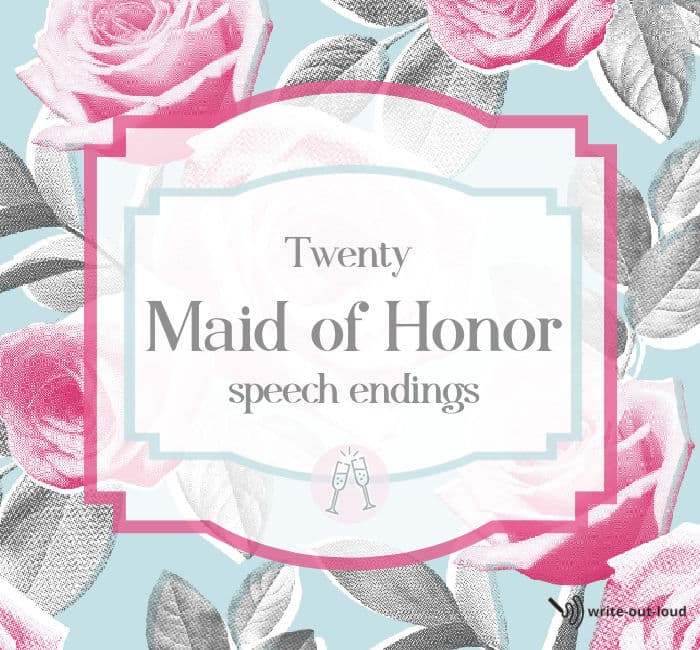
How to write a speech introduction
Now that you know how to end a speech effectively, find out how to open one well. Discover the right hook to use to captivate your audience.
Find out more: How to write a speech introduction: 12 of the very best ways to open a speech.
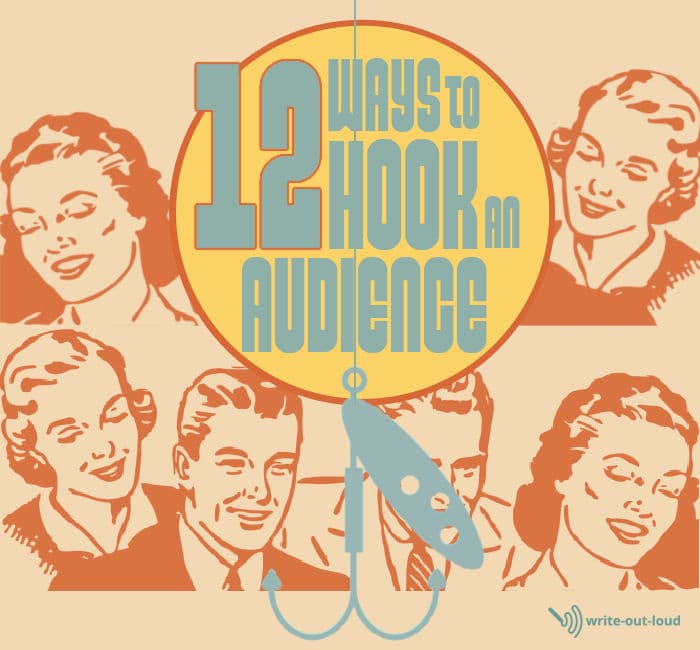
More speech writing help
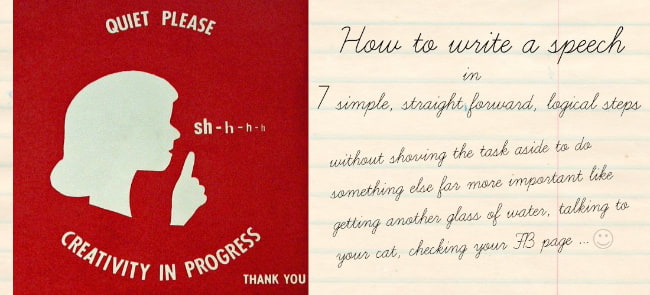
You do not need to flail around not knowing what to do, or where to start.
Visit this page to find out about structuring and writing a speech.
You'll find information on writing the body, opening and conclusion as well as those all important transitions. There's also links to pages to help you with preparing a speech outline, cue cards, rehearsal, and more.
Research on what, and how, people remember: primacy and recency
McLeod, S. A. (2008). Serial position effect. (Primacy and recency, first and last) Simply Psychology.
Hopper, Elizabeth. "What Is the Recency Effect in Psychology?" ThoughtCo, Feb. 29, 2020.
ScienceDirect: Recency Effect - an overview of articles from academic Journals & Books covering the topic.
- Back to top of how to end a speech page

